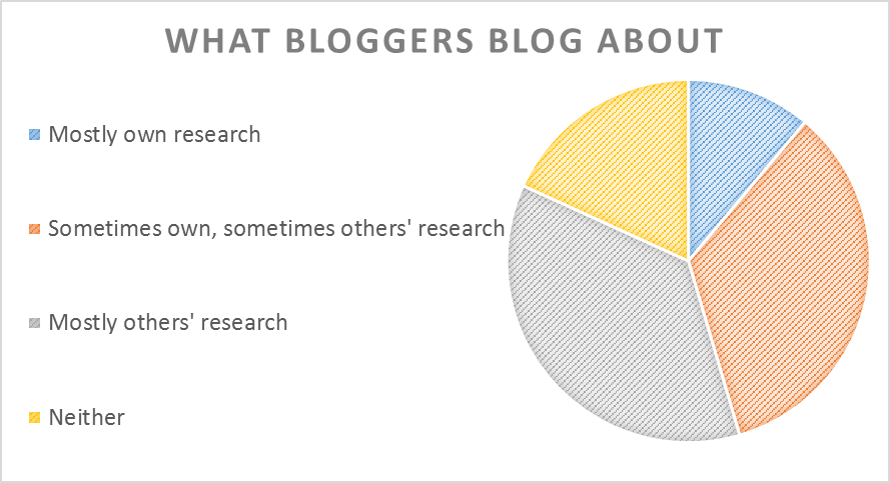Science Blogging: Got Comments?
 In a recent study of science bloggers, Merja Mahrt and Cornelius Puschmann found that the blog author very much influences the degree of commenting on his or her own blog posts. How? Through language complexity and topic selection.
In a recent study of science bloggers, Merja Mahrt and Cornelius Puschmann found that the blog author very much influences the degree of commenting on his or her own blog posts. How? Through language complexity and topic selection.
In a content analysis of over 200 posts at scienceblogs.com, researchblogging.org, hypotheses.org, amazings.es and scilogs.de (the German partner of SciLogs.com), these researchers found blog posts that received the most comments dealt either with common controversies (climate change, vaccinations, food safety) or political angles of science, including gender differences and open access. Heavily-commented blog posts were also almost always written in simpler language (low language complexity). Comment heavy blog posts often focused on current events with broad audience appeal.
Mahrt and Puschmann conclude from their findings that “it is very much up to the blogger to create the setting in which interaction and mediation of academic content can take place.”
The paper, published in the online Journal of Science Communication, features a number of other interesting results, albeit within a limited area of science blogging – focused on blogging academics. The researchers conducted a survey of 44 bloggers at SciLogs.de in 2012, finding that a majority of the bloggers were male (73%), covered natural sciences topics (59%) and held a Ph.D. (46%).
Looking at the motives these bloggers have to write, Mahrt and Puschmann found that a large majority blog for the enjoyment of writing (79%). Other strong motives include presenting science to the public (67%) and discussing scientific issues or aspects of their research with others (61%). But it’s interesting that at SciLogs.de, over a third of bloggers indicate that their readers are “overly critical.” Slightly less than a third of the bloggers indicate that commenters “want to pick a fight.” I wonder if this is a function of the blogging culture and audience at SciLogs.de, or if these bloggers pick slightly controversial or hair-rising topics?* Mahrt and Puschmann seem to suspect the later, as most of the surveyed bloggers at SciLogs.de indicate being particularly “undeterred by critical comments.”
*I say this because I haven’t noticed such a critical or negative commenting culture at SciLogs.com.
In my opinion, however, Mahrt and Puschmann don't include in their paper at JCOM some of the more interesting findings of their research on science bloggers. In a kind response to my request for any extra data they might have on how the science bloggers they surveyed pick their blogging topics and story ideas (the subject of my own dissertation #MySciBlog), Mahrt and Puschmann uploaded this supplementary data to figshare.com.
I’ve illustrated their data visually below. Most SciLogs.de bloggers choose to blog about others’ research as opposed to their own research. I think this is a fair assessment that might generalize beyond SciLogs.de. In fact, bloggers on more popular science blogging networks seem to rarely write (at least primarily) about their own research unless it highlights a point they are trying to make about a broader scientific issue, or gives context to another researcher’s study. Also, a good percentage of bloggers don’t write about research at all, instead delving into public discourse on scientific issues more broadly.
In another data-rich survey question, Mahrt and Puschmann asked the 44 SciLogs.de bloggers how they select topics for blog posts. Again, a relative minority indicate reporting on their own ongoing academic work. The two most popular topic selection mechanisms include writing about something encountered in a scholarly research article (71%) or writing about something heavily debated in the media (71%). Around half of the bloggers also indicate that they blog to correct something they’ve heard or read elsewhere, an approach that certainly reflects the history and culture of science bloggers as media critics and pursuers of accuracy. Note: I think there are a fair number of blogging selection mechanisms not represented here – if you also find topics missing, add them in a comment on this blog post.
Slightly over half of the 44 surveyed SciLogs.de bloggers say they have a central topic or theme, and use this topic or theme to select relevant story ideas from various angles. In another approach to blogging topics, science bloggers at more popular blogging networks might comment more on current events than SciLogs.de bloggers indicate.
I personally find it interesting that a high proportion of SciLogs.de bloggers indicate writing about something that is heavily debated in the media. In my own interviews with science bloggers this summer (from a range of popular U.S. and U.K. blogging networks and self-hosted blogs), I’ve found that many bloggers are hesitant to write about something heavily debated or covered by other media outlets. That is, they are hesitant unless the heavily debated topic or story falls within their area of expertise or their blogging theme, or they believe they have a unique angle or perspective to add to the debate. It is certainly true that many English-speaking science bloggers have, in more recent years, shifted from serving primarily as media critics to often serving as creators and breakers of science news. It might also be that science bloggers in a more saturated blogging environment are increasingly focused on distinguishing themselves and their blogs by covering unique stories not being talked about by more popular media outlets.
Do you have any thoughts or insights about this data? Please comment below!
References:
- Mahrt, Merja; Puschmann, Cornelius (2014): Science blogging: An exploratory study of motives, styles, and audience reactions (supplementary data). figshare. http://dx.doi.org/10.6084/m9.figshare.1120486


